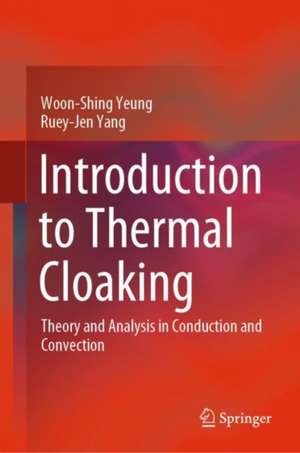Introduction to Thermal Cloaking: Theory and Analysis in Conduction and Convection
Autor Woon-Shing Yeung, Ruey-Jen Yangen Limba Engleză Hardback – 4 dec 2021
While not intended to be a general reference in the vast field of thermal cloaking research, this book is a unique monograph addressing the theoretical and analytical aspects of thermal cloaking within the scope mentioned above. This book also contains many independent analytical solutions to thermal cloaking problems that are not available in open literature. It is suitable for a three-credit graduate or advanced undergraduate course in engineering science.
| Toate formatele și edițiile | Preț | Express |
|---|---|---|
| Paperback (1) | 998.19 lei 6-8 săpt. | |
| Springer Nature Singapore – 5 dec 2022 | 998.19 lei 6-8 săpt. | |
| Hardback (1) | 1004.19 lei 6-8 săpt. | |
| Springer Nature Singapore – 4 dec 2021 | 1004.19 lei 6-8 săpt. |
Preț: 1004.19 lei
Preț vechi: 1224.62 lei
-18% Nou
Puncte Express: 1506
Preț estimativ în valută:
192.16€ • 205.48$ • 160.21£
192.16€ • 205.48$ • 160.21£
Carte tipărită la comandă
Livrare economică 18 aprilie-02 mai
Preluare comenzi: 021 569.72.76
Specificații
ISBN-13: 9789811675492
ISBN-10: 981167549X
Pagini: 259
Ilustrații: XVII, 259 p. 79 illus., 54 illus. in color.
Dimensiuni: 155 x 235 mm
Greutate: 0.57 kg
Ediția:1st ed. 2022
Editura: Springer Nature Singapore
Colecția Springer
Locul publicării:Singapore, Singapore
ISBN-10: 981167549X
Pagini: 259
Ilustrații: XVII, 259 p. 79 illus., 54 illus. in color.
Dimensiuni: 155 x 235 mm
Greutate: 0.57 kg
Ediția:1st ed. 2022
Editura: Springer Nature Singapore
Colecția Springer
Locul publicării:Singapore, Singapore
Cuprins
Introduction.- Review of Curvilinear Coordinates.- Review of Heat Conduction.-Transformation Theory for Conduction Thermal Cloaking.- Bilayer Theory for Conduction Thermal Cloaking.- General Consideration of Bilayer Thermal Cloak.- Transformation Theory for Convection Thermal Cloaking.- Bilayer Theory for Convection Thermal Cloaking.- Transient Thermal Cloaking.- Numerical Simulation and Experiments.- Prologue: Engineering Application and Perspectives.
Notă biografică
Woon-Shing Yeung: Since receiving his Ph.D. from the University of California at Berkeley in 1979, Dr. Yeung has spent over ten years in academia teaching in the Mechanical Engineering Department at the University of Massachusetts at Lowell, and over 25 years working in industry in the USA. Currently, he is a Visiting Specialist at National Cheng Kung University in Taiwan, engaging in thermal cloaking research and teaching, and has co-authored a few publications on thermal cloaking.
Ruey-Jen Yang: Dr. Yang has worked in industry in the USA for over 10 years after receiving his Ph.D. from the University of California at Berkeley in 1982. Professor Yang joined the National Cheng Kung University since 1993 and currently is a Chair Professor and a research fellow of the Taiwan Ministry of Science and Technology. He is also a fellow of the American Society of Mechanical Engineers (ASME) and Society of Theoretical and Applied Mechanics (STAM). His research focuses on Fluid/Thermal Sciences, Microfluidics and Energy Conversion.
Ruey-Jen Yang: Dr. Yang has worked in industry in the USA for over 10 years after receiving his Ph.D. from the University of California at Berkeley in 1982. Professor Yang joined the National Cheng Kung University since 1993 and currently is a Chair Professor and a research fellow of the Taiwan Ministry of Science and Technology. He is also a fellow of the American Society of Mechanical Engineers (ASME) and Society of Theoretical and Applied Mechanics (STAM). His research focuses on Fluid/Thermal Sciences, Microfluidics and Energy Conversion.
Textul de pe ultima copertă
This book introduces the fundamental concepts of thermal cloaking based on transformation theory and bilayer theory, under the conduction and convection heat transfer modes. It focuses on thermal cloaking with detailed explanations of the underlying theoretical bases leading to the primary thermal cloaking results in open literature, from an engineering perspective, and with practical application in mind. Also, the authors strive to present the materials with an emphasis on the related physical phenomena and interpretation, to the extent possible. Through this book, engineering students can grasp the fundamental ideas of thermal cloaking and the associated mathematics, thus being better able to initiate their own research and explore new ideas in thermal cloaking.
While not intended to be a general reference in the vast field of thermal cloaking research, this book is a unique monograph addressing the theoretical and analytical aspects of thermal cloaking within the scope mentioned above. This book also contains many independent analytical solutions to thermal cloaking problems that are not available in open literature. It is suitable for a three-credit graduate or advanced undergraduate course in engineering science.
While not intended to be a general reference in the vast field of thermal cloaking research, this book is a unique monograph addressing the theoretical and analytical aspects of thermal cloaking within the scope mentioned above. This book also contains many independent analytical solutions to thermal cloaking problems that are not available in open literature. It is suitable for a three-credit graduate or advanced undergraduate course in engineering science.
Caracteristici
Explains underlying mathematical details of thermal cloaking and corresponding physical interpretation as applicable Expounds the bilayer theory in the thermal cloaking in details Presents the materials from an engineering perspective, with practical application in mind
